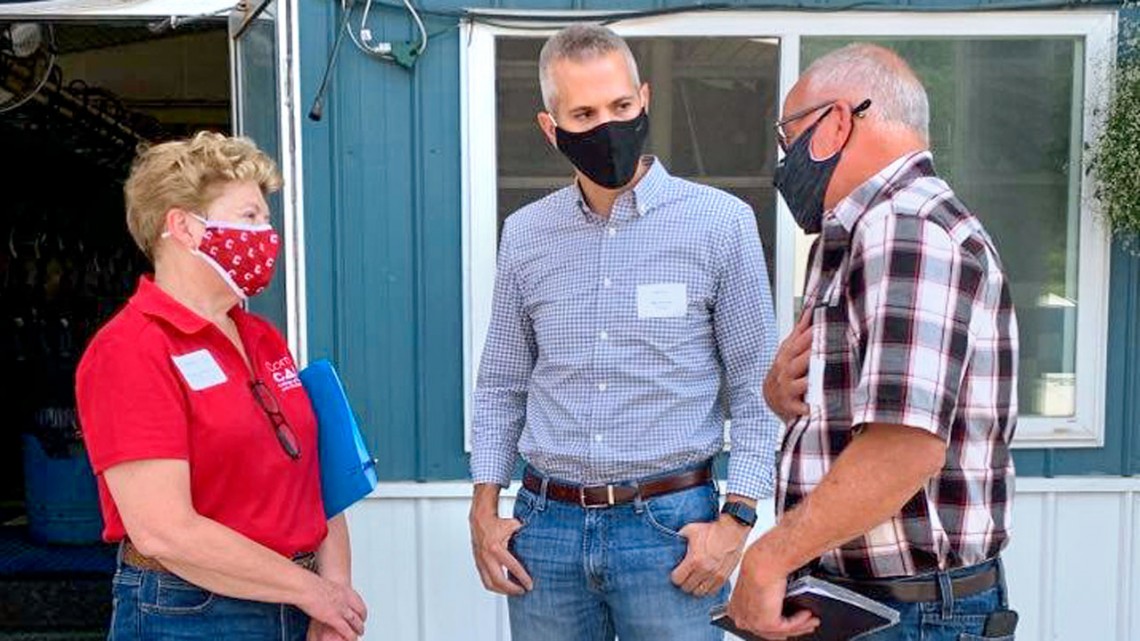
Kathryn Boor ’80, the Ronald P. Lynch Dean of Agriculture and Life Sciences, left, is pictured with New York Congressman Anthony Brindisi, center, and David Fisher, president of the New York Farm Bureau, during an event Aug. 10 at E-Z Acres dairy farm in Homer.
Boor tours dairy farm with Rep. Brindisi, touts ag research
U.S. Rep. Anthony Brindisi, a New York Democrat, met Aug. 10 with farmers and agricultural thought leaders – including Kathryn Boor ’80, the Ronald P. Lynch Dean of the College of Agriculture and Life Sciences – for a farm tour and roundtable discussion about the importance of agricultural research.
The event, organized by the nonprofit Farm Journal Foundation, was held at E-Z Acres dairy farm in Homer, which is owned and operated by Mike McMahon ’73 and his wife, Edie.
The event highlighted how research is being applied at the farm level to help farmers become more profitable and sustainable. The U.S. farm economy faces challenges on multiple fronts – extreme weather, low prices, strained trade relationships and now COVID-19, which is wreaking havoc on farm and food supply chains.
Boor said the COVID-19 global pandemic underscores the need for increased long-term support for agricultural research.
“While the country’s short-term needs are many during this pandemic, we cannot lose sight of the long-term gains of funding agricultural research and development,” Boor said. “To achieve the sweeping, transformational changes essential to truly sustainable agricultural systems, we need a reinvestment in applied agricultural research and a reorientation of the national research portfolio to include consideration of sustainability issues.”
At the event, Brindisi – whose legislative district covers a wide swath of the region and includes Binghamton, Cortland and Utica – announced plans to co-sponsor the America Grows Act, which authorizes a 5% increase in annual funding for the next five years to four U.S. Department of Agriculture research agencies: the Agricultural Research Service (ARS); the Economic Research Service (ERS); the National Agricultural Statistics Service (NASS); and the National Institute of Food and Agriculture (NIFA).
In particular, ARS and NIFA conduct research across a wide variety of scientific areas, including ways to prevent pest and disease outbreaks from hurting farm productivity and food supplies. Speakers noted this type of research is vital in the time of COVID-19, which has exposed how quickly diseases can spread and how vulnerable our systems can be when outbreaks occur.
“During this pandemic, our farmers have worked overtime to keep food on our shelves and our families fed,” Brindisi said. “Now more than ever, we need to be investing in ag research to make sure the farms of today are ready for the challenges of tomorrow.”
Agricultural research can provide solutions to help farms become more resilient. Technologies developed in the U.S. can also benefit small-scale farmers in developing countries, speakers said.
For more than 20 years, E-Z Acres has worked as a case farm for Cornell CALS. Together with the Cornell University Nutrient Management Spear Program, E-Z Acres monitored its herd, soil and crop data and developed a plan to sustainably improve cow health, milk output and forage production – all while reducing its environmental footprint, improving soil health and protecting local water quality.
In 2018, the McMahons won a national sustainability award from U.S. Dairy.
“When we first became a Cornell University case farm in 1997, our business was suffering, but the team’s research really helped us turn things around,” Mike McMahon said. “Expanded public support for the kind of research taking place at Cornell University is absolutely critical for the future of American farming, if we want to maintain our global leadership position in the years ahead.”
Agriculture is a $5.75 billion industry in New York and vitally important for the economy, contributing 200,000 jobs statewide. Dairy is New York’s top agricultural product, and provides about 26,000 jobs across New York.
Also attending the event were New York Farm Bureau President David Fisher; Joe Nehme, the central New York regional director for Sen. Chuck Schumer, D-New York; and Catherine Bertini, a distinguished fellow of global food and agriculture at the Chicago Council on Global Affairs.
“Agricultural research is at the heart of what we do on the farm today,” Fisher said. “It has given us increased crop efficiencies, led to better animal care, and improved sustainability. It will also help us meet challenges moving forward, like invasive species, extreme weather and processing needs. If we are to have a strong food system in New York and the country, we must continue to invest in our land grants and agricultural research.”
Media Contact
Get Cornell news delivered right to your inbox.
Subscribe

